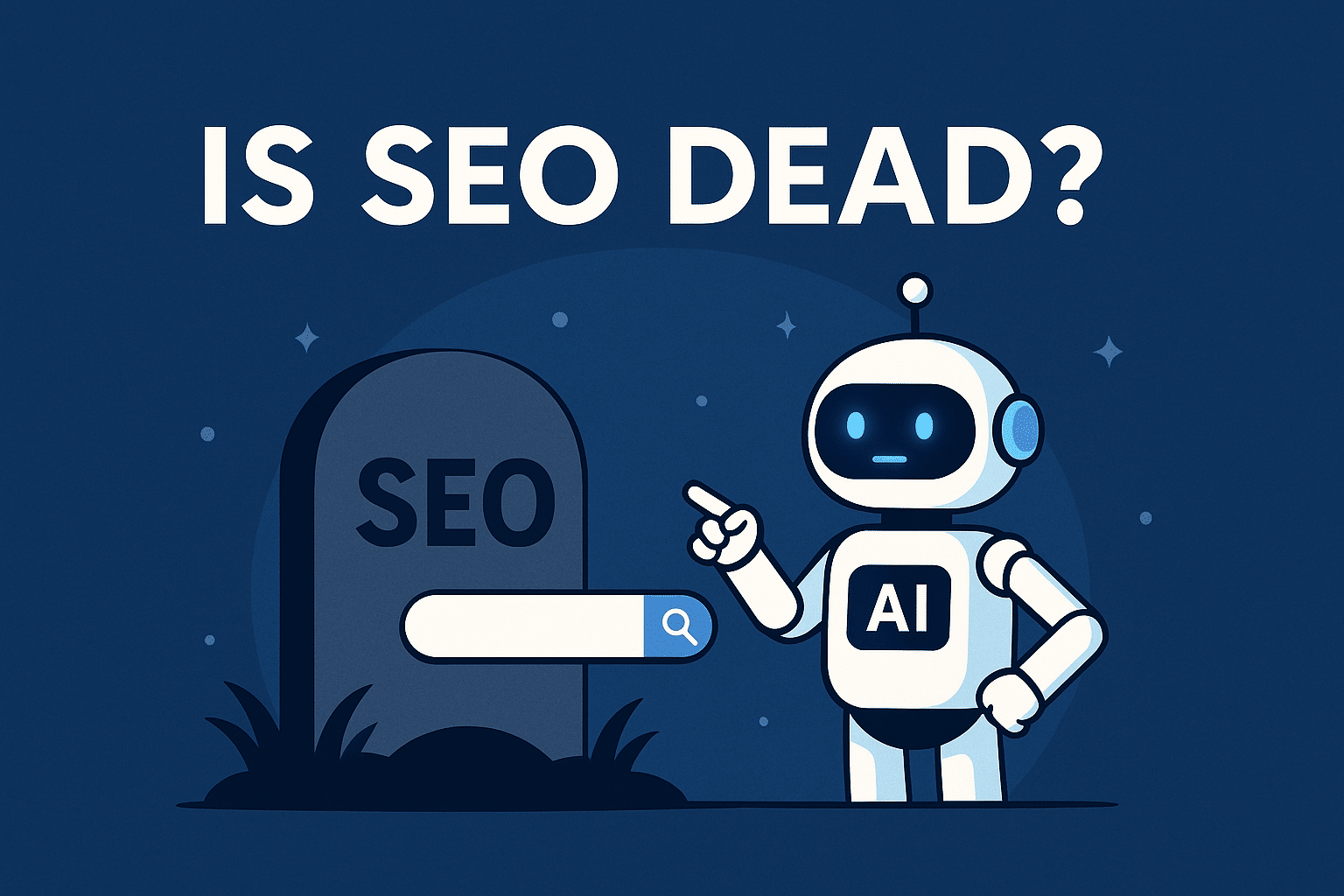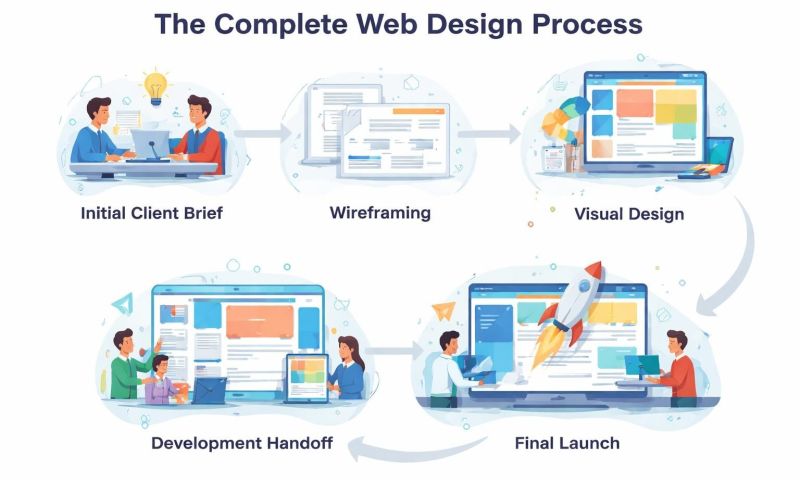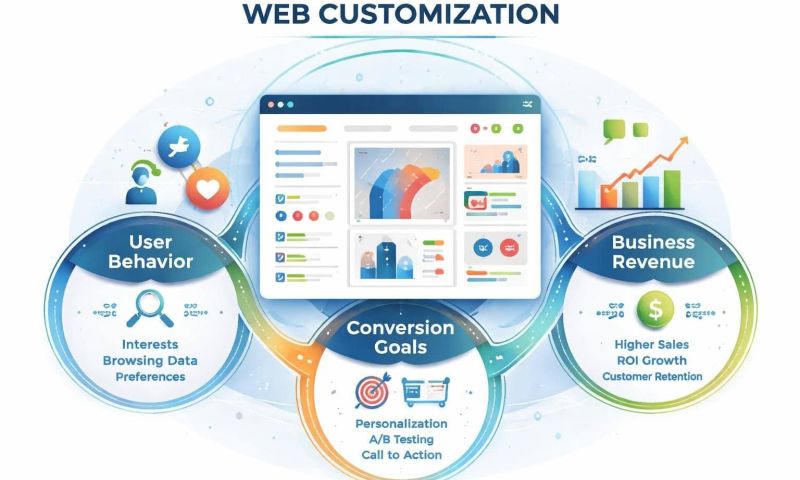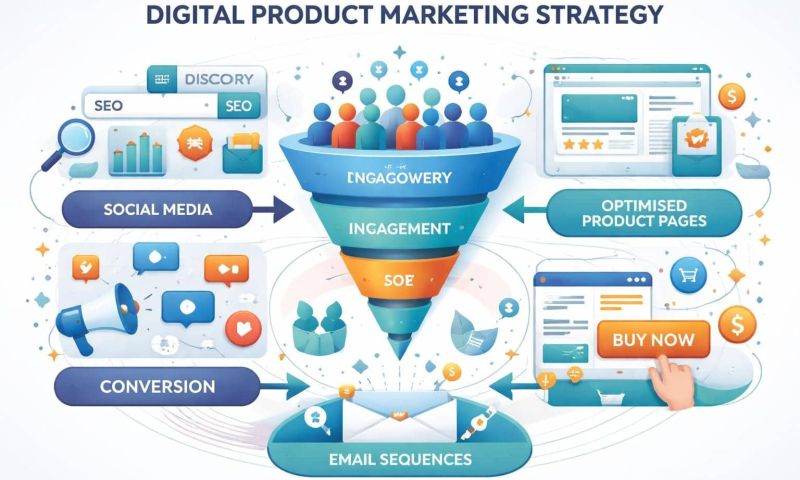
You’ve probably heard this before: “SEO is dead!” It seems like every time Google makes a change, someone’s declaring the end of search engine optimisation. But here we are in 2025, and the question feels more pressing than ever.
With AI churning out content at lightning speed, Google’s new AI-powered search experience changing how we see results, and more people getting answers without ever clicking through to websites, it’s natural to wonder if SEO has finally breathed its last breath.
The short answer? SEO isn’t dead. But it’s definitely not the same game it used to be.
Why Everyone Keeps Writing SEO’s Obituary
Every Google update seems to trigger the same reaction. Site owners watch their traffic drop and immediately assume SEO has died. But here’s the thing: this has been happening for years, and SEO keeps adapting.
The folks at Ahrefs actually dug into this question with real data and found something interesting: SEO isn’t dying, it’s just changing. The sites that adapt survive and thrive. The ones that don’t? Well, they get left in the dust.
SEO Today is Harder, But Not Dead
Let’s be honest: ranking well in 2025 is tough. Gone are the days when you could stuff keywords into mediocre content and call it a day. Google’s got smarter. It understands what people actually want, not just what words they type.
The challenge now is standing out in an ocean of content. Everyone’s publishing. AI tools are generating millions of articles daily. The bar for quality has never been higher.
To succeed today, you need:
- Genuine expertise and authority
- Well-structured, properly marked-up content
- Smart connections between your pages
- Content that genuinely helps people
The Real Challenge: AI is Changing the Game
Here’s where things get interesting. AI isn’t just creating more content, it’s changing how people search. Google now often provides AI-generated answers right at the top of search results. People get their answers without visiting any website at all.
This doesn’t spell doom for SEO, but it does mean you need to think bigger. You can’t rely solely on Google traffic anymore. Building your own audience through email lists, communities, and brand recognition becomes crucial. You also need to think beyond Google: platforms like YouTube, TikTok, and even Reddit are becoming important search channels.
What Actually Works Right Now
Despite all the changes, some fundamentals still drive results:
Smart keyword targeting remains important. Focus on what people actually want to know, not just popular search terms.
Connecting your content through internal links helps both users and search engines understand your site better.
Truly helpful content wins every time. Not fluff, not filler: content that genuinely solves problems or answers questions.
Quality backlinks still matter, though relevance matters more than quantity these days.
Technical excellence is non-negotiable. Your site needs to load fast, work on mobile, and be easy for search engines to understand.
Building a Future-Proof Strategy
Want to stay ahead? Here’s what clever businesses are doing:
Establish real credibility. Your expertise needs to be obvious and verifiable. Google values content from people who actually know what they’re talking about.
Create content clusters. Build comprehensive topic coverage with main pages supported by related articles that dive deeper into specific aspects.
Help search engines understand your content with proper structured data markup.
Diversify your traffic sources. Don’t put all your eggs in one basket. Build audiences on multiple platforms.
Use AI thoughtfully. These tools can help with research and ideation, but they shouldn’t replace human insight and expertise.
The Bottom Line
SEO isn’t dead, but lazy SEO definitely is. If you’re still using outdated tactics like clickbait headlines, spinning content, or buying dodgy backlinks, you’re fighting yesterday’s battle with tomorrow’s weapons.
Modern SEO requires more sophistication. It’s about understanding what people really need, providing it in a well-structured way, and building genuine authority in your field.
The businesses succeeding with SEO in 2025 aren’t just chasing rankings: they’re building long-term value for their audiences. And that approach will serve them well no matter how much the search landscape continues to evolve.
SEO has survived countless predictions of its demise. It’ll likely survive many more, continuing to adapt as technology and user behaviour change. The question isn’t whether SEO will survive: it’s whether your approach will evolve with it.
You’ve probably heard this before: “SEO is dead!” It seems like every time Google makes a change, someone’s declaring the end of search engine optimisation. But here we are in 2025, and the question feels more pressing than ever.
With AI churning out content at lightning speed, Google’s new AI-powered search experience changing how we see results, and more people getting answers without ever clicking through to websites, it’s natural to wonder if SEO has finally breathed its last breath.
The short answer? SEO isn’t dead. But it’s definitely not the same game it used to be.
Why Everyone Keeps Writing SEO’s Obituary
Every Google update seems to trigger the same reaction. Site owners watch their traffic drop and immediately assume SEO has died. But here’s the thing: this has been happening for years, and SEO keeps adapting.
The folks at Ahrefs actually dug into this question with real data and found something interesting: SEO isn’t dying, it’s just changing. The sites that adapt survive and thrive. The ones that don’t? Well, they get left in the dust.
SEO Today is Harder, But Not Dead
Let’s be honest: ranking well in 2025 is tough. Gone are the days when you could stuff keywords into mediocre content and call it a day. Google’s got smarter. It understands what people actually want, not just what words they type.
The challenge now is standing out in an ocean of content. Everyone’s publishing. AI tools are generating millions of articles daily. The bar for quality has never been higher.
To succeed today, you need:
- Genuine expertise and authority
- Well-structured, properly marked-up content
- Smart connections between your pages
- Content that genuinely helps people
The Real Challenge: AI is Changing the Game
Here’s where things get interesting. AI isn’t just creating more content, it’s changing how people search. Google now often provides AI-generated answers right at the top of search results. People get their answers without visiting any website at all.
This doesn’t spell doom for SEO, but it does mean you need to think bigger. You can’t rely solely on Google traffic anymore. Building your own audience through email lists, communities, and brand recognition becomes crucial. You also need to think beyond Google: platforms like YouTube, TikTok, and even Reddit are becoming important search channels.
What Actually Works Right Now
Despite all the changes, some fundamentals still drive results:
Smart keyword targeting remains important. Focus on what people actually want to know, not just popular search terms.
Connecting your content through internal links helps both users and search engines understand your site better.
Truly helpful content wins every time. Not fluff, not filler: content that genuinely solves problems or answers questions.
Quality backlinks still matter, though relevance matters more than quantity these days.
Technical excellence is non-negotiable. Your site needs to load fast, work on mobile, and be easy for search engines to understand.
Building a Future-Proof Strategy
Want to stay ahead? Here’s what clever businesses are doing:
Establish real credibility. Your expertise needs to be obvious and verifiable. Google values content from people who actually know what they’re talking about.
Create content clusters. Build comprehensive topic coverage with main pages supported by related articles that dive deeper into specific aspects.
Help search engines understand your content with proper structured data markup.
Diversify your traffic sources. Don’t put all your eggs in one basket. Build audiences on multiple platforms.
Use AI thoughtfully. These tools can help with research and ideation, but they shouldn’t replace human insight and expertise.
The Bottom Line
SEO isn’t dead, but lazy SEO definitely is. If you’re still using outdated tactics like clickbait headlines, spinning content, or buying dodgy backlinks, you’re fighting yesterday’s battle with tomorrow’s weapons.
Modern SEO requires more sophistication. It’s about understanding what people really need, providing it in a well-structured way, and building genuine authority in your field.
The businesses succeeding with SEO in 2025 aren’t just chasing rankings: they’re building long-term value for their audiences. And that approach will serve them well no matter how much the search landscape continues to evolve.
SEO has survived countless predictions of its demise. It’ll likely survive many more, continuing to adapt as technology and user behaviour change. The question isn’t whether SEO will survive: it’s whether your approach will evolve with it.
Founder






